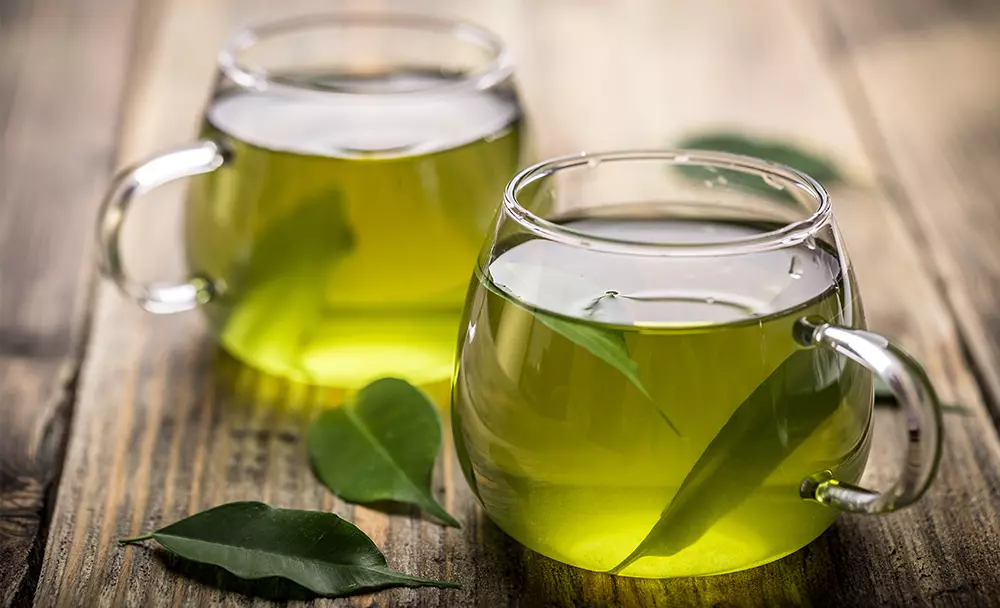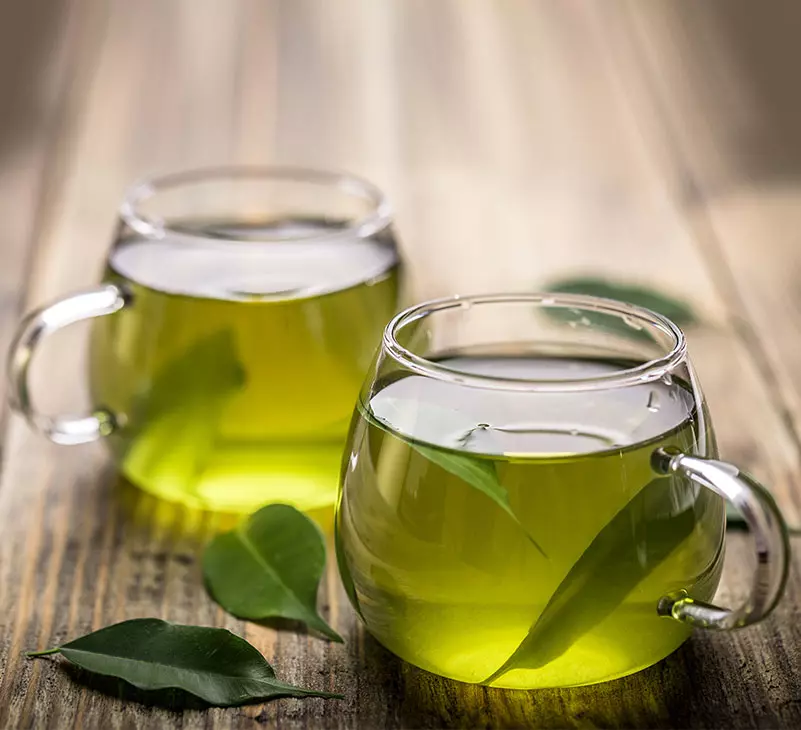This article is reviewed by an expert

People have hailed the incredible benefits of green tea for centuries. Rich in antioxidants, it is touted as one of the healthiest beverages on the planet.
Do you drink green tea or want to start consuming it? If yes, then you are at the right place.
Here are some of the most surprising benefits of green tea which you must know.
The Many Benefits of Green Tea
Brain Health
Primary Benefits: Caffeine, one of the main ingredients of green tea, helps increase the levels of neurons and the concentration of neurotransmitters like dopamine and norepinephrine (1).
Secondary Benefits: Caffeine can therefore help improve mood, vigilance, reaction time, and memory and boost overall brain function (2).
Metabolic Health
Primary Benefits: According to research, green tea is one of the best ways to burn fat naturally and boost metabolic rate (3). In addition, it also contains caffeine which is known to metabolise fatty acids from fat tissue and convert them into a usable energy form (4) (5).
Secondary Benefits: Green tea can help improve physical performance (4) (5) as well as aid in losing weight (14) (15). By reducing the absorption rate of sugar and fat and enhancing fat metabolism, green tea can further help in weight loss (16).
Anti-Oxidant Effects
Primary Benefits: Green tea is loaded with antioxidants and helps fight oxidative stress.
Secondary Benefits: Oxidative damage is one of the leading causes of cancer. Loaded with antioxidants, green tea can help lower the risk of many cancers, such as breast cancer, prostate cancer and colorectal cancer (6) (7) (8) (9).
Diabetes Management
Primary Benefits: Many studies have shown that green tea helps improve insulin sensitivity and lower blood sugar levels in the body (10).
Secondary Benefits: As a result, green tea has been found to be very effective in managing and preventing type 2 diabetes (10).
Cardiovascular Health
Primary Benefits: According to research, green tea helps manage total cholesterol and LDL or bad cholesterol levels (11). In addition, it also increases the antioxidant capacity of the blood, which consequently protects LDL particles from oxidation (12) (13). Research has also confirmed green tea’s oxidation and vasodilation effects on blood pressure levels (20).
Secondary Benefits: Green tea can therefore help prevent and manage several heart diseases including hypertension.
Digestive Health
Primary Benefits: Green tea is rich in catechins and polyphenols, which can help lower inflammation (17).
Secondary Benefits: It can therefore help reduce the symptoms of inflammatory bowel disease (17).
Skin Health
Primary Benefits: Green tea is loaded with catechins which are potent anti-inflammatory and anti-microbial agents (18).
Secondary Benefits: It can therefore help treat acne and boost overall skin health.
Liver Health
Primary Benefits: Studies have shown that green tea helps reduce the levels of enzymes responsible for liver damage, like ALT and AST. In addition, green tea also helps lower the levels of bad cholesterol in the body (19).
Secondary Benefits: Green tea may therefore help improve liver function and treat fatty liver disease (19).
How To Make Green Tea?
First, boil some water. Then, add green tea leaves into it and steep them for a few minutes. Next, strain and pour the green tea into a cup and drink while it’s hot. You can also add cinnamon, ginger, lemon, mint, chamomile or other herbs into it to avail more benefits.
Side Effects of Green Tea (21)
Although green tea is usually safe for consumption, it is advised to always consult a doctor before consuming it.
Some of the side effects it may cause include:
- nervousness & anxiety
- headaches
- tremors
- reduced blood pressure
- restlessness
- insomnia
- irritation in the digestive tract
If you experience any of these side effects, consult your doctor immediately.
On a Final Note
Green tea is one of the most popular teas in the world, with astounding health benefits. It helps benefit skin health, digestive health, heart health, etc. and prevent several diseases, including diabetes, cancer and many more. However, since it’s a herbal tea, it is advised to consult your doctor before consuming it to avoid any side effects.
Disclaimer: This article is written from a health and lifestyle perspective.
References
- https://www.ncbi.nlm.nih.gov/pubmed/1356551
- https://onlinelibrary.wiley.com/doi/full/10.1111/j.1467-3010.2007.00665.x
- https://journals.physiology.org/doi/full/10.1152/ajpregu.00832.2005?url_ver=Z39.88-2003&rfr_id=ori:rid:crossref.org&rfr_dat=cr_pub%3dpubmed
- https://www.ncbi.nlm.nih.gov/pubmed/16371327
- https://www.ncbi.nlm.nih.gov/pubmed/26568580
- https://www.ncbi.nlm.nih.gov/pmc/articles/PMC2990475/
- https://www.ncbi.nlm.nih.gov/pubmed/19437116
- https://academic.oup.com/aje/article/167/1/71/185454
- https://www.ncbi.nlm.nih.gov/pubmed/28454102
- https://academic.oup.com/ajcn/article/98/2/340/4577179
- https://doi.org/10.1002/14651858.CD009934.pub2
- http://www.sciencedirect.com/science/article/pii/S0021915099002397
- http://www.sciencedirect.com/science/article/pii/S0940299397800966
- https://www.sciencedirect.com/science/article/abs/pii/S0031938407004003
- https://onlinelibrary.wiley.com/doi/full/10.1038/oby.2009.256
- https://www.mdpi.com/1420-3049/23/5/1176/pdf
- https://www.sciencedirect.com/science/article/abs/pii/S0965229918311555
- https://onlinelibrary.wiley.com/doi/abs/10.1002/ptr.6809
- https://onlinelibrary.wiley.com/doi/abs/10.1002/ptr.6130
- https://www.jpsr.pharmainfo.in/Documents/Volumes/vol8Issue10/jpsr08101608.pdf
- https://onlinelibrary.wiley.com/doi/abs/10.1002/ptr.6063
























